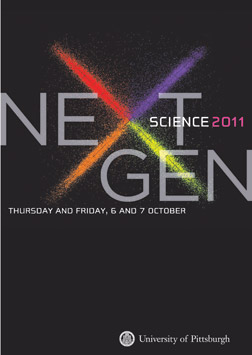Pitt’s ‘Science 2011—Next Gen’ Set for Oct. 6-7 in Alumni Hall
 Science 2011: Next Gen, the University’s 11th annual showcase of the region’s latest research in science, engineering, medicine, and computation, will be held on Oct. 6 and 7 in Alumni Hall. In addition to highlighting the region’s most promising biomedical research, Science 2011 will demonstrate how these projects can be a catalyst for regional economic development; foster collaboration among academic and industrial scientists; and promote the idea to the public that science can be interesting, exciting, and fun.
Science 2011: Next Gen, the University’s 11th annual showcase of the region’s latest research in science, engineering, medicine, and computation, will be held on Oct. 6 and 7 in Alumni Hall. In addition to highlighting the region’s most promising biomedical research, Science 2011 will demonstrate how these projects can be a catalyst for regional economic development; foster collaboration among academic and industrial scientists; and promote the idea to the public that science can be interesting, exciting, and fun.
All Science 2011 events and lectures will be free and open to the public, but registration is required.
One of the event’s highlights, the Dickson Prize in Medicine Lecture, will be delivered on Thursday, Oct. 6, at 11 a.m. by J. Craig Venter, founder and president of the J. Craig Venter Institute and founder and CEO of Synthetic Genomics Inc. In a talk titled “From Reading to Writing the Genetic Code,” Venter will describe some of his research team’s best-known achievements: In 2001, it completed the first draft of the human genome, which was a composite of several individuals, and the first diploid human genome—Venter’s own—in 2007. Last year, Venter and his team announced that they had constructed a synthetic organism that could replicate by inserting a computer-designed genome made of nonliving material into bacterial cells.
The names and presentations of other renowned researchers delivering plenary lectures at Science 2011 follow.
• Provost Lecture, 4 p.m. Oct. 6: “The Biophysics of Protein-Ligand Binding: What Is the Water Doing?” presented by George M. Whitesides, the Woodford L. and Ann A. Flowers University Professor, Harvard University. Whitesides is known for his contributions to many fields, including nanotechnology, microfabrication, and microfluidics; is listed as an inventor on more than 100 patents; and has cofounded at least a dozen companies, including Genzyme.
• Mellon Lecture, 11 a.m. Oct. 7: “Host Defense Strategies,” presented by Ruslan Medzhitov, the David W. Wallace Professor of Immunobiology at Yale University and an investigator, Howard Hughes Medical Institute. In 1997, Medzhitov and his team identified and characterized Toll-like receptor 4, a member of a class of molecules that plays a key role in the innate immune system by recognizing potential threats and tagging them for elimination.
• Klaus Hofmann Lecture, 4 p.m. Oct. 7: “Variability, Compensation, and Modulation in Neurons and Networks,” presented by Eve Marder, the Victor and Gwendolyn Beinfield Professor of Neuroscience, Brandeis University. Marder is exploring how individual neurons interact with one other to form dynamic neural circuits and has shown that rather than being “hard-wired,” these circuits can be reconfigured. This has implications for human memory formation, motor control, behavioral plasticity, and mood disorders.
Twelve spotlight sessions are planned for Oct. 6 and 7, focusing on topics that include, among others, “Building a Genome From Genes,” “Putting Watson to Work in Health Care,” and “Renew, Recycle—Innovative Energy.”
An under-graduate research poster reception will be held at 5 p.m. Oct. 6, with undergrads from across the University exhibiting faculty-mentored research posters in basic science, medicine, and engineering.
A full schedule of Science 2011 events and registration details are available at www.science2011.pitt.edu.
Other Stories From This Issue
On the Freedom Road

Follow a group of Pitt students on the Returning to the Roots of Civil Rights bus tour, a nine-day, 2,300-mile journey crisscrossing five states.
Day 1: The Awakening
Day 2: Deep Impressions
Day 3: Music, Montgomery, and More
Day 4: Looking Back, Looking Forward
Day 5: Learning to Remember
Day 6: The Mountaintop
Day 7: Slavery and Beyond
Day 8: Lessons to Bring Home
Day 9: Final Lessons

